
|
Appendix B - Health Issues |

|
Malaria still kills one million Africans annually. The threat is real, and strains resistant to standard drug "cocktails" are rife through much of the tropics. The best medicine is simply avoidance by wearing long-sleeve shirts and trousers; application of DEET-containing lotion or spray; and sleeping under a bed net.
Several medicines are available, each with a different dosage regimen. I choose doxycycline, a broad-spectrum antibiotic that is taken once daily beginning two days before entering the "problem area", and continuing unabated until 30 days after leaving it. Other medicines are more expensive, including Malarone - a combination of two antimalarial agents, atovaquone and proguanil. There is also mefloquine ("Lariam") - with a high incidence of adverse psychological effects.
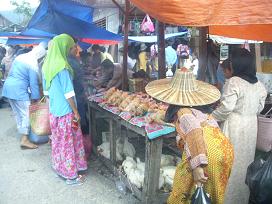
|
| Chickens for-sale, open air market. |
Doxycycline's antibiotic properties are a recognized deterrent to unknown "bugs" that otherwise might have me quite ill. In essence, with doxycycline I get a two-for-one deal.
Adhering to the "30 day rule", it was bizarre to take a daily antimalarial pill while climbing high peaks in Colorado and Wyoming this August!
The threat is small or nonexistent on our montane venues. However on lower slopes, and outside major population centers, mosquitoes are present ...
"Shhhh!" Hear that?
"Bzzzzzzzz..."
Normally mosquitos are a mere nuisance. However in southeast Asia they signify a serious threat that, if unlucky enough, results in debilitating illness and worse.
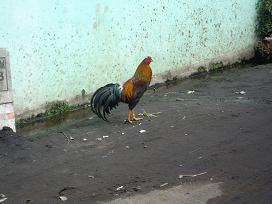
|
| Rooster on the main street, Ranu Pani. |
So on hearing that high-pitched whine, even at 2 a.m., it's time for the DEET.
We always endeavor to sleep in an air conditioned room when traveling. Once, on entering Jakarta we examined an establishment touted for their cheap rates ($8). Upon entering the non-conditioned room I noted the bed frame (to support a bed net).
"Nyamuk?" ("Are there mosquitoes?")
"Ada." ("There are.")
With that reply we left for a pricier ($17) yet air conditioned hotel across the street.
We each brought a lightweight bed net, yet never used them.
Other diseases exist, yet most can be addressed with immunizations prior to traveling. I paid $275 to be immunized against hepatitis A, tetanus-diphtheria booster, typhoid, and poliomyelitis A. I declined to receive immunizations for other ailments because the risk / cost ratio is small - hepatitis B, Japanese encephalitis, and rabies. No vaccine exists for dengue fever, also mosquito-transmitted. Finally, there is the current scare about H5N1 bird-flu virus. We simply would not visit poultry farms.
The second major issue is one that plagues all foreign travelers to Third World lands - bad water. Indeed, "Montezuma's revenge" has a constraining effect on what I allow myself to eat and drink at restaurants and elsewhere.
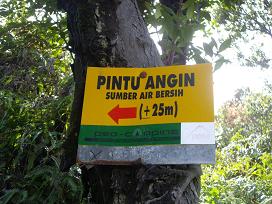
|
|
"Clean water in 25 meters" - Gunung Marapi, Sumatra. |
For example, I may not have ice cubes to cool my beverage - and this is quite annoying since it is hot and stuffy. I cannot stand ordering a hot drink under those conditions; yet the alternative is to go thirsty since only (bad) water is served upon being seated.
Most meals feature spicy food - and to eat the entire thing without drinking anything is asking a lot of somebody. Bob tolerates room temperature soda pop so he is covered (generally he orders two bottles). Robert invariably orders a liter of Bintang beer so HE is covered. As I don't like luke warm soda and actually hate beer, I generally either drink nothing or have hot tea which simultaneously fails to quench my thirst with spicy food, while filling my belly with empty calories.
Iced fruit drinks are available at many food stalls - "es buah". They are inviting indeed, yet, again, being made with dubious ice are highly suspect.
All water in the backcountry is treated with iodine - or boiled if used for cooking supper.
That all three of us eventually succumbed to some gastric upset indicates that Montezuma's revenge attacks with frequency - clearly, the most probable health problem encountered on a long journey to southeast Asia.
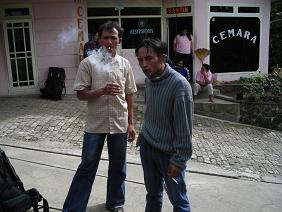
|
|
Two Indonesian men doing what they most enjoy - smoke. |
A third health issue is that nearly all Indonesian men smoke. They do so at every convenience, often to the point that it sickens me to think how many will eventually succumb to lung cancer. Our mountain guides and porters smoke at rest breaks. Taxi drivers would try to smoke in the car - but I would forbid it. They invariably relish the next break so as to get outside and puff away!
My brother Dale has a working hypothesis. Indonesia is mainly Muslim so alcohol is forbidden. There is a death penalty for bringing drugs into the country. So how else is one to get a "fix"? Yep, nicotine.
Indonesian men are also underweight (at least by western standards), and I suspect that their smoking habit dulls the appetite. In fact, I never saw one fat Indonesian. Most Malaysians and Indonesians are small; and many younger people are shockingly thin. That said, we did not see any signs of extreme poverty or malnutrition throughout our journies except possibly on the outskirts of Jakarta.
The following guidelines are provided by the Center for Disease Control (CDC) for travelers to southeast Asia.
WHAT YOU NEED TO BRING...
DO NOT...
MALARIA RISK BY COUNTRY
Malaysia: Risk limited to rural areas. No risk in urban and coastal areas. Note: No risk in Republic of Singapore.
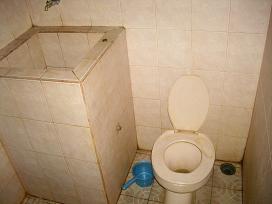
|
|
In low-end hotels toilets do not flush automatically. Basin water is poured into the toilet with a pot. |
Indonesia: Risk in all areas of Irian Jaya (western half of island of New Guinea) and at the temple complex of Borobudur on Java. Risk in rural areas only in remainder of islands and in Aceh province (updated March 24, 2005). No risk in cities on Java and Sumatra and no risk in the main resort areas of Java and Bali.
Travelers to malaria-risk areas in Indonesia, East Timor, Laos, Malaysia, and Vietnam should take atovaquone/proguanil, doxycycline, mefloquine (or primaquine in special circumstances).
Most antimalarial drugs are well-tolerated; most travelers do not need to stop taking their drug because of side effects. However, if you are particularly concerned about side effects, discuss the possibility of starting your drug early (3-4 weeks in advance of your trip) with your health care provider. If you cannot tolerate the drug, ask your doctor to change your medication.
UPON RETURNING HOME...
If you have visited a malaria-risk area, continue taking your antimalarial drug for 4 weeks (chloroquine, doxycycline, or mefloquine) or seven days (atovaquone/proguanil) after leaving the risk area.
Malaria is always a serious disease and may be a deadly illness. If you become ill with a fever or flu-like illness either while traveling in a malaria-risk area or after you return home (for up to 1 year), you should seek immediate medical attention and should tell the physician your travel history.
| previous page - Transportation | next page - Food and Drink |